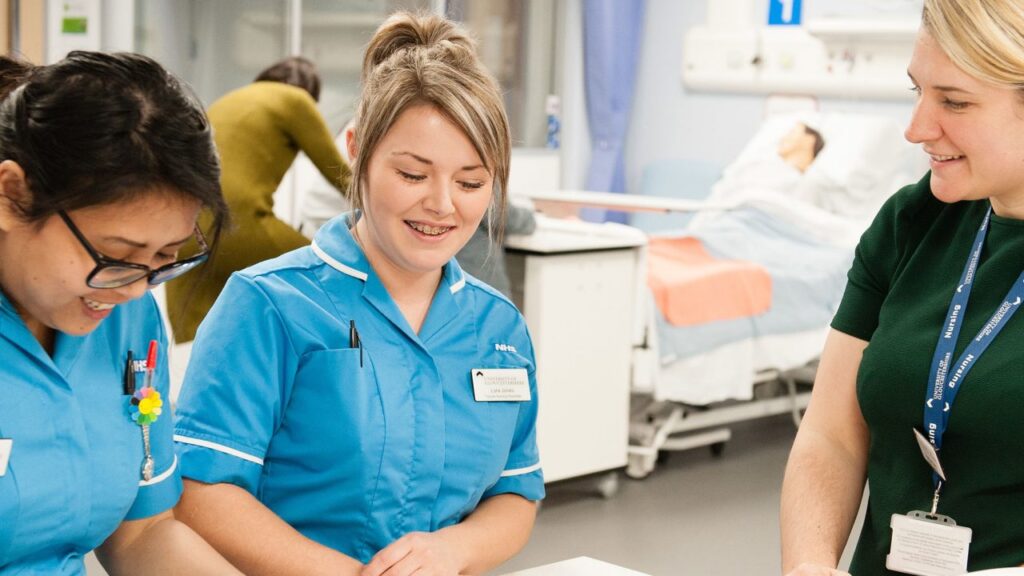Nursing is more than looking after patients. It’s the ability to be resilient even at the toughest of times, showing compassion for all patients and to use critical thinking to make the best decision for vulnerable people.
Do you think you’re suitable for this role and want to get started in learning how to become a healthcare professional? Wait no longer and apply to become a Registered Nurse (Bcs) today!
Read the description below to learn more about the role of a Registered Nurse (Bcs).

What are Nurses and Why are they Important?
In the UK, nurses play an essential part in not just the healthcare industry but the lives of hundreds and thousands of people, which is why to become a nurse you must undergo intense on-the-job training and learning before you can become a qualified nurse. This is determined by the Nursing and Midwifery Council (NMC) who are responsible for providing the appropriate regulations for all aspiring nurses to have the necessary training, learning and medical procedures so they can deliver the best quality of care to all patients and service users across four different fields of practice; adult, mental health, learning disabilities and children. Once completing a nursing apprenticeship program, you are deemed as a qualified registered nurse by the NMC and are eligible to officially work as a healthcare professional.
Key Responsibilities
During your Apprenticeship as a Registered Nurse, your responsibilities will include:
- Be an accountable professional acting in the best interests of people, putting them first and providing nursing care that is person-centred, safe and compassionate
- Be an accountable professional, providing person-centred, safe, and compassionate care
- Communicate effectively, be a role model, and be accountable.
- Promote health and prevent illness to improve mental, physical, and behavioural health
- Assess individual nursing needs and plan care using evidence-based interventions and support
- Provide and evaluate nursing care, taking the lead in providing evidence-based, compassionate, and safe interventions
- Improve safety of care by assessing and managing risks, putting people’s needs and preferences first
- Improve quality of care by contributing to the continuous monitoring and quality improvement of care and treatment
- Provide professional leadership in coordinating and managing complex nursing and integrated care needs
- Lead nursing care, taking responsibility for managing nursing care and delegating and supervising care provided by others
- Work in teams, collaborating and communicating effectively with colleagues
The Skills You’ll Need:
- Be a professional nurse who acts in the best interests of people and provides safe, compassionate care.
- Think critically and use evidence-based practice.
- Be resilient and emotionally intelligent.
- Be accountable for your own actions and those of others you delegate to.
- Communicate effectively and work well with others.
- Support vulnerable people and be an advocate for them.
- Provide person-centred care that is free from discrimination.
- Manage risks and improve the quality of care.
- Lead and manage nursing care effectively.
- Be a role model for others.
Benefits:
- Earn a while you learn
- Gain valuable work experience
- Achieve a degree in Nursing and become a registered nurse
Educational Background (required):
To qualify for a Registered Nurse Degree Apprenticeship role, you must have the following:
- Level 2 Maths & English
- Degree in Nursing or L7 qualification approved by the NMC where the apprentice already holds a Level 6 degree
Apprentices without Level 2 Maths and English will be expected to complete this before their End-Point-Assessment
Apprentices who have passed Level 2 Maths and English, health and care plan or legal statement, will be expected to complete Entry Level 3 (or A British Sign Language qualification as an alternative) during their apprenticeship
Professional Recognition:
Nursing and Midwifery Council (NMC) / Minimum Level 6 for 6
Regulated Occupation:
Yes
Regulator Body:
Nursing and Midwifery Council
Training Provider:
Must be approved by the NMC
EPAO:
Does not require approval by the NMC
Occupational Level:
6
Duration:
48 months
Review Cycle:
3 years
How To Apply:
Please visit the website of the Nursing & Midwifery Council or your preferred training provider for more information on how to apply for this apprenticeship program.


